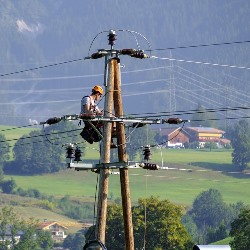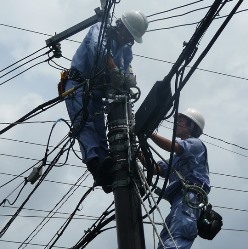How to Select the Best Electrician Training School near Stacy North Carolina
 The initial step to learning to be an electrical contractor or tradesman is finding an electrician trade school near Stacy NC. But with so many technical schools to select from, just how do you go about making certain that you enroll in the ideal one? Especially since there are so many variables to evaluate. For instance, many potential students will commence by looking for schools that are close to their home. Once they have found some that are within commuting distance, they will choose the one with the lowest tuition. Even though location and cost are significant, they are not the only things that must be evaluated. Also critical are the accreditation and reputations of the schools, along with their job placement and graduation rates. These and other qualifications should influence your ultimate decision when selecting an electrician training school. We will address that checklist in greater detail later in this article. But first, let’s talk a little bit about being an electrician and the educational options that are available.
The initial step to learning to be an electrical contractor or tradesman is finding an electrician trade school near Stacy NC. But with so many technical schools to select from, just how do you go about making certain that you enroll in the ideal one? Especially since there are so many variables to evaluate. For instance, many potential students will commence by looking for schools that are close to their home. Once they have found some that are within commuting distance, they will choose the one with the lowest tuition. Even though location and cost are significant, they are not the only things that must be evaluated. Also critical are the accreditation and reputations of the schools, along with their job placement and graduation rates. These and other qualifications should influence your ultimate decision when selecting an electrician training school. We will address that checklist in greater detail later in this article. But first, let’s talk a little bit about being an electrician and the educational options that are available.
Click Here to Get Free Information on Electrician Schools Near You!
Electrician Degree, Certificate and Diploma Programs
 There are several options to receive electrician instruction in a trade or technical school near Stacy NC. You can select a diploma or certificate program, or obtain an Associate Degree. Bachelor’s Degrees are obtainable at a few schools, but are not as common as the other three options. Frequently these programs are made available together with an apprenticeship program, which are required by most states to be licensed or if you intend to earn certification. Bellow are brief explanations of the 3 most prevalent programs available.
There are several options to receive electrician instruction in a trade or technical school near Stacy NC. You can select a diploma or certificate program, or obtain an Associate Degree. Bachelor’s Degrees are obtainable at a few schools, but are not as common as the other three options. Frequently these programs are made available together with an apprenticeship program, which are required by most states to be licensed or if you intend to earn certification. Bellow are brief explanations of the 3 most prevalent programs available.
- Certificate and Diploma Programs are usually offered by North Carolina technical and trade schools and take approximately a year to complete. They furnish a good foundation and are aimed towards those who wish to enter an apprenticeship more quickly as a journeyman electrician.
- Associate Degree Programs involve two years to finish and are provided by North Carolina junior or community colleges, commonly as an Associate Degree in Electrical Technology. They furnish a more well-rounded education while providing the foundation that prepares students to begin their apprenticeship program.
As earlier mentioned, Bachelor’s Degrees are accessible at some North Carolina colleges, but are less popular at four years than the other shorter programs. The majority of states mandate that an apprenticeship of no less than 2 years and in most cases 4 years be performed prior to licensing. For that reason, the majority of students are anxious to commence their paid apprenticeship, especially if it’s not part of their academic program.
Electrician Certification and Licensing Criteria
 Electricians in Stacy NC can undertake a wide range of services, including installing, replacing and testing electrical systems, and making sure that the wiring in buildings and homes comply with code standards. After concluding an apprenticeship, journeyman electricians are mandated to become licensed in most states or municipalities. The length of apprenticeship differs by state, but normally about four to five years of prior experience is needed before taking the licensing exam. The exams commonly evaluate electrical theory and general knowledge, along with knowledge of the National Electrical Code (NEC). Obtaining certification is also an optional means for an electrician to identify him or herself as a experienced and skilled professional. The certifications offered vary by state and may be acquired in many specialties, including cable splicing as an example. The certification process usually entails three levels of proficiency:
Electricians in Stacy NC can undertake a wide range of services, including installing, replacing and testing electrical systems, and making sure that the wiring in buildings and homes comply with code standards. After concluding an apprenticeship, journeyman electricians are mandated to become licensed in most states or municipalities. The length of apprenticeship differs by state, but normally about four to five years of prior experience is needed before taking the licensing exam. The exams commonly evaluate electrical theory and general knowledge, along with knowledge of the National Electrical Code (NEC). Obtaining certification is also an optional means for an electrician to identify him or herself as a experienced and skilled professional. The certifications offered vary by state and may be acquired in many specialties, including cable splicing as an example. The certification process usually entails three levels of proficiency:
- An experience requirement
- Passing a written exam
- Passing a practical exam
Examples of certifying organizations include the National Joint Apprenticeship and Training Committee (NJATC) and also the National Institute for Certification in Engineering Technologies (NICET). It’s imperative that the electrician tech school that you enroll in not only furnishes a solid academic foundation, but also helps prep you for passing any licensing and certification examinations that you might be required to pass in the future.
Attending Electrician Online Programs
 A possibility that you may have considered is selecting an online electrician program to earn a degree or a certificate. Although online training programs have become more prevalent as a means of attending class without needing to travel, in this instance they are not entirely internet based. Just about all electrician schools require partial attendance on campus to get hands-on practical training. But since the remainder of the classes may be accessed online, internet learning may be a more practical choice for individuals that have limited time for schooling. And as a bonus many online schools have a cheaper tuition cost compared to their traditional alternatives. Commuting expenses from Stacy NC are also reduced and some of the study materials may be available online as well. All of these benefits can make online electrician tech schools more economical and convenient. And a number are fully accredited, which we will address in our due diligence checklist.
A possibility that you may have considered is selecting an online electrician program to earn a degree or a certificate. Although online training programs have become more prevalent as a means of attending class without needing to travel, in this instance they are not entirely internet based. Just about all electrician schools require partial attendance on campus to get hands-on practical training. But since the remainder of the classes may be accessed online, internet learning may be a more practical choice for individuals that have limited time for schooling. And as a bonus many online schools have a cheaper tuition cost compared to their traditional alternatives. Commuting expenses from Stacy NC are also reduced and some of the study materials may be available online as well. All of these benefits can make online electrician tech schools more economical and convenient. And a number are fully accredited, which we will address in our due diligence checklist.
Things to Ask Electrician Trade Schools
 When you have decided to earn a certificate, diploma or degree, you can begin to focus your training options. Since there are numerous electrician trade and vocational schools in the Stacy NC area, it’s important to have a checklist of criteria that each school must satisfy. The initial two that we mentioned were location and tuition expense. If you have an interest in earning an online degree, then that needs to be a feature that your chosen school offers. And while all three qualifiers may be critical when making your determination, there are additional variables that need to be taken into account as well. Below is a checklist of those added qualifiers that you will need to analyze prior to enrolling in an electrical tech school.
When you have decided to earn a certificate, diploma or degree, you can begin to focus your training options. Since there are numerous electrician trade and vocational schools in the Stacy NC area, it’s important to have a checklist of criteria that each school must satisfy. The initial two that we mentioned were location and tuition expense. If you have an interest in earning an online degree, then that needs to be a feature that your chosen school offers. And while all three qualifiers may be critical when making your determination, there are additional variables that need to be taken into account as well. Below is a checklist of those added qualifiers that you will need to analyze prior to enrolling in an electrical tech school.
Accreditation. Many electrician trade schools have attained either a regional or a national accreditation. They may receive Institutional Accreditation, which focuses on the school’s programs overall, or Programmatic Accreditation, which relates to a specific program, for instance electrical technology. Make certain that the Stacy NC school and program are accredited by a U.S. Department of Education approved accrediting agency, for instance the Accreditation Board for Engineering and Technology. In addition to helping guarantee that you get an excellent education, it can assist in acquiring financial aid or student loans, which are often not available for non-accredited schools. Furthermore, many states require that the electrician training course be accredited for it to be approved for licensing.
High Completion and Placement Rates. Ask the electrician training programs you are reviewing what their completion rates are. The completion rate is the portion or percentage of students who enroll in and finish the program. A low completion rate might suggest that students were disappointed with the course and dropped out. It could also indicate that the instructors were not qualified to instruct the students. It’s also important that the schools have high job placement rates. Older and/or more reputable schools may have a broader directory of graduates, which may result in more contacts for the school to employ for their apprenticeship and job placement programs. A high job placement rate will not only confirm that the school has a good reputation within the industry, but also that it has the network of contacts to help Stacy NC grads acquire apprenticeships or jobs.
Apprenticeship Programs. Most electrician training programs are taught in conjunction with an apprenticeship or an internship program. Those participating trade and vocational schools will help place you in an apprenticeship program inside their network of electrician contractors or trade unions. Check if the schools you are considering have referring relationships with Stacy NC area electricians or electrical professionals. An apprenticeship not only provides a valuable experience by supplying hands-on training, but it also provides job opportunities and helps to form relationships in the regional electrician professional community.
Modern Facilities. Make certain that the campus facilities and the equipment that you will be instructed on are up-to-date and what you will be using on the job. If you are presently in an internship or an apprenticeship, check with the electrical technician you are working under regarding what you should be expecting. If not, ask a local Stacy NC electrical company if they can give you some tips. Also bear in mind that unless you are able to move, the school must be within driving distance of your Stacy residence. Remember that if you decide to attend an out-of-state school, in addition to relocation costs there can be higher tuition fees compared to in-state residents.
Smaller Classes. It’s desirable that you receive as much personalized instruction as possible, which can be difficult in larger classes. Ask if you can sit in on a few of the classes so that you can see how large they are and experience the interaction between teachers and students. Talk to a few of the students and get their opinions concerning class sizes and instruction. Finally, talk with a few of the teachers and learn what their level of experience is and what certifications or degrees they hold.
Flexible Scheduling. Confirm that the class schedules for the programs you are reviewing are flexible enough to fulfill your needs. If you are only able to go to classes at night or on weekends near Stacy NC, check that the programs you are comparing offer those choices. If you can only attend part-time, make sure that the school you select offers part-time enrollment. Additionally, ask what the policy is to make-up classes should you miss any due to work, illness or family emergencies.
Trade School For Electrician Stacy North Carolina
 Picking the best electrical training program will probably be the most important decision you will make to launch your new career. You originally came to this website due to an interest in Trade School For Electrician and wanting more information on the topic How Many Years To Become An Electrician. But as we have discussed in this article, there are a number of factors that you will need to evaluate and compare among the training programs you are looking at. It’s a must that any electrical training that you are evaluating includes a considerable amount of hands-on training. Classes should be small in size and every student must have their own equipment to train with. Classroom teaching needs to provide a real-world perspective, and the course of study should be up-to-date and conform with industry standards. Training programs vary in duration and the type of credential provided, so you will need to determine what length of program and certificate or degree will best satisfy your needs. Every program provides different options for certification as well. Probably The ideal approach to research your short list of schools is to go to each campus and speak with the faculty and students. Invest some time to attend a few classes. Tour the campus and facilities. Make certain that you are confident that the training program you choose is the ideal one for you. With the proper training, hard work and commitment, the end result will be a new trade as a professional electrician in Stacy NC.
Picking the best electrical training program will probably be the most important decision you will make to launch your new career. You originally came to this website due to an interest in Trade School For Electrician and wanting more information on the topic How Many Years To Become An Electrician. But as we have discussed in this article, there are a number of factors that you will need to evaluate and compare among the training programs you are looking at. It’s a must that any electrical training that you are evaluating includes a considerable amount of hands-on training. Classes should be small in size and every student must have their own equipment to train with. Classroom teaching needs to provide a real-world perspective, and the course of study should be up-to-date and conform with industry standards. Training programs vary in duration and the type of credential provided, so you will need to determine what length of program and certificate or degree will best satisfy your needs. Every program provides different options for certification as well. Probably The ideal approach to research your short list of schools is to go to each campus and speak with the faculty and students. Invest some time to attend a few classes. Tour the campus and facilities. Make certain that you are confident that the training program you choose is the ideal one for you. With the proper training, hard work and commitment, the end result will be a new trade as a professional electrician in Stacy NC.
More Electric Locations in North Carolina
2019 Atlantic hurricane season
The 2019 Atlantic hurricane season is an ongoing event in the annual formation of tropical cyclones in the Northern Hemisphere. The season officially began on June 1, 2019, and will end on November 30, 2019. These dates historically describe the period each year when most tropical cyclones form in the Atlantic basin and are adopted by convention. However, tropical cyclogenesis is possible at any time of the year, as demonstrated by the formation of Subtropical Storm Andrea on May 20, marking the record fifth year in a row where a tropical or subtropical cyclone developed before the official start of the season, breaking the previous record set in 1951–1954.[1]
Ahead of and during the season, several national meteorological services and scientific agencies forecast how many named storms, hurricanes, and major hurricanes (Category 3 or higher on the Saffir–Simpson scale) will form during a season and/or how many tropical cyclones will affect a particular country. These agencies include the Tropical Storm Risk (TSR) Consortium of University College London, the National Oceanic and Atmospheric Administration (NOAA) and Colorado State University (CSU). The forecasts include weekly and monthly changes in significant factors that help determine the number of tropical storms, hurricanes, and major hurricanes within a particular year. Some of these forecasts also take into consideration what happened in previous seasons and the state of the El Niño–Southern Oscillation (ENSO). On average, an Atlantic hurricane season between 1981 and 2010 contained twelve tropical storms, six hurricanes, and three major hurricanes, with an Accumulated Cyclone Energy (ACE) index of between 66 and 103 units.[2]
The first forecast for the year was released by TSR on December 11, 2018, which predicted a slightly below-average season in 2019, with a total of 12 named storms, 5 hurricanes, and 2 major hurricanes, due to the anticipated presence of El Niño conditions during the season.[3] On April 4, 2019, CSU released its forecast, predicting a near-average season of 13 named storms, 5 hurricanes and 2 major hurricanes.[4] On April 5, TSR released an updated forecast that reiterated its earlier predictions.[5]North Carolina State University released their forecast on April 16, predicting slightly-above average activity with 13–16 named storms, 5–7 hurricanes and 2–3 major hurricanes.[6] On May 6, The Weather Company predicted a slightly-above average season, with 14 named storms, 7 hurricanes, and 3 major hurricanes.[7] The UK Met Office released their forecast May 21, predicting 13 named storms, 7 hurricanes, 3 major hurricanes and an Accumulated Cyclone Energy of 109 units.[8] On May 23, NOAA released their first prediction, calling for a near-normal season with 9–15 named systems, 4–8 hurricanes, and 2–4 major hurricanes.[9] On May 30, TSR released an updated forecast which increased the number of forecast hurricanes from 5 to 6.[10]
Business Results 1 - 10 of 3





